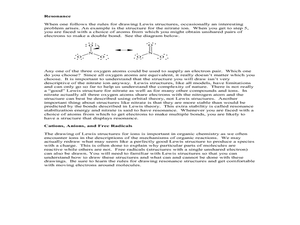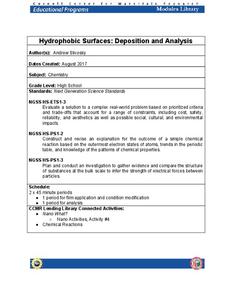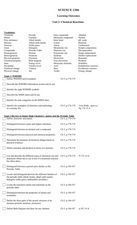Curated OER
Stoichiometry
In this stoichiometry activity, students review definitions and equations associated with molarity, density, atomic mass, molarity, and dilutions. This activity has 18 word problems.
Curated OER
The Photoelectric Effect in Photocells
Illuminate your physics class with this examination of a photovoltaic cell. Teach the structure and operation of the device using a diagram. Then make a human-powered, larger-than-life sized model of a PV cell. Learners become electrons...
Curated OER
Drawing Lewis Structures
In this drawing Lewis structures worksheet, students read about the 5 steps taken to draw Lewis structures for atoms and molecules. These include identifying the valence electrons, placing pairs of electrons between atoms to be bonded,...
Cornell University
Hydrophobic Surfaces—Deposition and Analysis
Couches, carpets, and even computer keyboards now advertise they are spill-resistant, but what does that mean? Scholars use physical and chemical methods to coat surfaces with thin films to test their hydrophobic properties. Then they...
Curated OER
Calculating Isotopes Review Sheet
In this isotopes review sheet, learners determine the atomic mass for three elements and they answer questions about isotopes.
It's About Time
Chemical Names and Formulas
Abracadabra! Provide your class with the tools to perform a chemical "magic show" as they predict the charges of various ions, determine ionic compound formulas, and make observations to determine when a chemical reaction between two...
It's About Time
What Determines and Limits an Atom's Mass?
Provide learners with the tools to further understand nuclear energy and isotopes. Young chemists investigate the components of an atom's nucleus, use symbols to represent various isotope forms, and use the percent abundance of an atom's...
It's About Time
How Atoms Interact with Each Other
Connect the dots and assist young chemists as they demonstrate covalent and ionic bonding. Class members use their knowledge of valence electrons to predict compound formulas as they arrange electrons into various bonding structures to...
It's About Time
Are Atoms Invisible?
Wow, an experiment that allows the class to participate in a missile war! Pupils discuss Thomsons's theory of cathode rays and simulate Rutherford's historical experiment to learn about atomic structure. They conclude this fourth lesson...
It's About Time
The Chemical Behavior of Atoms
Assist your class with this colorful activity as students view and interpret changes in the hydrogen atom. They discuss concepts of the electromagnetic spectrum and use Bohr's model to predict wavelengths and light patterns,...
Polar Trec
What Is My Footprint?
How do one's habits and lifestyle choices affect the environment? Through a short online survey, learners will calculate their own carbon footprints then determine how to reduce their impact on the environment through simple steps, such...
Cornell University
What Happens When We Excite Atoms and Molecules?
Excited atoms lead to exciting lessons! Learners use heat and light to excite both atoms and molecules. They display their learning in the form of Bohr models depicting the excited state of the atoms.
Curated OER
The Mole Concept
The need for a counting unit is mentioned as you introduce the mole to your young chemists. Use this presentation to explain Avogadro's number and describe the incredible quantity it represents. Lecture notes are included for most of the...
Alabama Learning Exchange
Float or Sink?
Experiment with mass and density as scholars figure out what makes things float or sink. First, they watch a podcast introducing these concepts. Be sure to use the comprehension question to test their understanding. Young scientists...
Beyond Benign
Catalysts and Oxygen
Here is an engaging and hands-on lesson plan that allows high school chemists to demonstrate the effects of a catalyst on various chemicals. They garner knowledge of how reactants and products differ from one another, while analyzing the...
NOAA
Ocean Acidification
If tap water is more acidic than ocean water, why are we so concerned about ocean acidification? The third installment of a 23-part NOAA Enrichment in Marine sciences and Oceanography (NEMO) program focuses on carbon dioxide levels in...
Cornell University
Bacteria Take Over and Down
Bacteria outnumber all other forms of life on Earth. Scholars observe the growth of bacteria in petri dishes to understand their role in maintaining good health. Then, they observe the growth of bacteria after they introduce...
Curated OER
Learning Outcomes
In this science worksheet, learners explore the learning outcomes for a unit on chemical reactions. Students define 60 vocabulary words and answer a list of questions for each topic.
Curated OER
Introduction to the Mole
Learners are introduced to the mole concept using a discovery-based method. Lesson includes activities with candy that allow students to discover the rules for mole-item, item-mole, mole-mass, and mass-mole conversions.
Curated OER
Comparing Properties of Elements & Compounds
In this elements and compounds worksheet, students review the physical properties of different compounds and elements using websites for information. This worksheet has 1 graphic organizer and 1 short answer question.
Curated OER
Gases
In this gases activity, students review the 3 states of matter, the types of molecular motion, and the characteristics of gases. This activity has 30 problems to solve.
Curated OER
Matter and Chemical Bonding
For this chemical bonding worksheet, students read about the invisible killer, dihydrogen monoxide. Students read about the products it is used in and the problems it causes to the environment. Then students complete 19 short answer...
Curated OER
How Can We Accurately Make Different Solutions of Different Concentrations?
High schoolers work together to create different solutions made from different concentrations of liquids. They record and analyze their data. They answer discussion questions to complete the instructional activity.
Curated OER
Ionic Chemical Formulas Days 1 & 2
Students study polyatomic ions and write binary and ternary ionic chemical formulas. They explore putting together different monatomic ions and coming up with as many chemical formulas as possible. They play a game similar to memory...

























